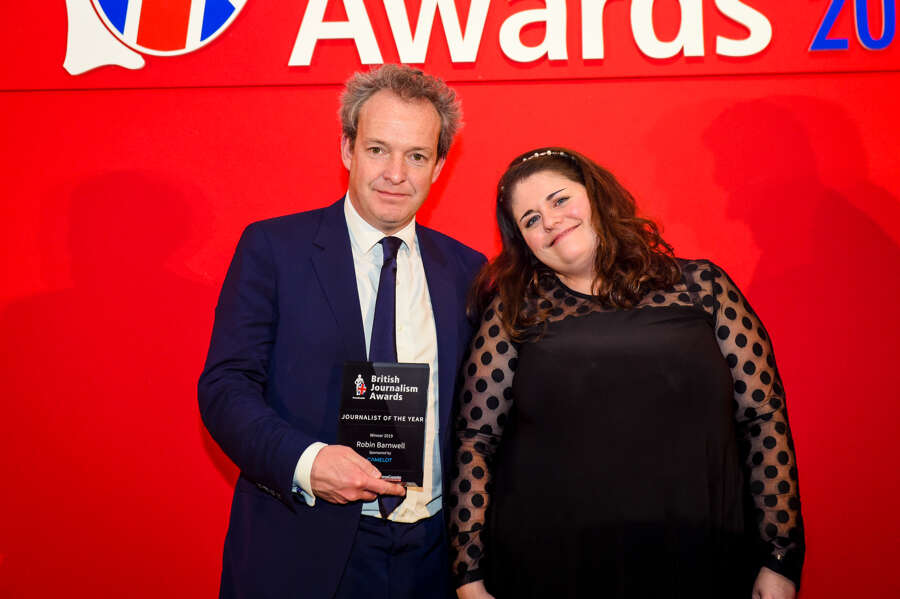
Newly named Journalist of the Year Robin Barnwell has paid homage to the “unsung heroes” who went undercover for his reports, insisting his award was “a tribute to their journalism, not mine”.
Barnwell took the top individual prize at the British Journalism Awards this week, where he also won the Foreign Affairs category.
Judges praised his work producing and directing films that shone a light on China’s use of Muslim detention camps in Xinjiang and Iranian women’s battle against oppression using the hijab.
The two documentaries, Undercover: Inside China’s Digital Gulag and Iran Unveiled: Taking on the Ayatollahs, were commissioned by ITV Exposure from Hardcash Productions, for which Barnwell works as a freelancer.
Barnwell told Press Gazette he was “really proud” of the small teams behind each documentary, including the filmmakers who went undercover in Iran and China and his producer Gesbeen Mohammed.
“It’s a huge honour to be recognised as Journalist of the Year, but like any journalism it’s a huge team effort and there are many people I need to thank who are very brave and who went to Iran and China and took enormous risks and the inspiring individuals who can’t be named,” he said.
“Often with undercover [work] it’s the undercover journalists who are the unsung heroes because they can’t often be named or identified for their own security and safety.”
Barnwell added: “I’m the filmmaker, I’m the director, but the tribute really has to go to the other people who are the unsung heroes of journalism often, not myself.”
The journalist said he had decided it would be impossible to get visas to go to China or Iran to film the documentaries himself.
“They would never allow it and also we wouldn’t have been able to carry out the investigative work with minders and being observed and watched constantly,” he said.
“The only way we could make both of those films was to work undercover.”
Access has become harder for many journalists because they now often have an online profile, Barnwell said. Other developments that made it more difficult include facial recognition and electronic passports.
Concern for journalists’ safety
The 46-year-old began covering wars around the world, including in Afghanistan, Iraq, Syria and the Congo, aged 21.
In 2006 he spent three weeks embedded with Al-Shabaab in Somalia, but believes that if he did the same now he “wouldn’t survive”.
Barnwell attributed this to the fact extremist groups including the Taliban and Al-Qaeda now distribute news through their own media networks, cutting out conventional journalists.
“That’s in a sense tragic because we can’t tell that side of the debate but in terms of what I’ve witnessed across the world I am very concerned about the safety of journalists in Iran, China,” he said
“It’s very difficult for them to operate freely at all… we then have to resort to undercover means in order to tell these stories.
“We’d rather obviously tell them openly, but we feel that in those circumstances where the governments are becoming more authoritarian – authoritarianism is on the rise worldwide and so it’s becoming increasingly difficult to tell stories in places like Turkey, China, Russia, Iran than it was in the past.
“That’s obviously devastating for international journalism and it means we have to resort to quite difficult means and we have to use very brave individuals to go and help us tell those stories.”
Barnwell thanked Tom Giles, ITV’s controller of current affairs, for commissioning the films, which each took some six months to make.
“These projects are expensive and they take a long time and they are very risky. Broadcasters now could easily decide to take the easy route and go for something which is quite quick and easy to make,” he said.
“I am really indebted to ITV for taking the risks with both of those projects and putting the resources in.”
Picture: Press Gazette / The Photo Team
Email pged@pressgazette.co.uk to point out mistakes, provide story tips or send in a letter for publication on our "Letters Page" blog
